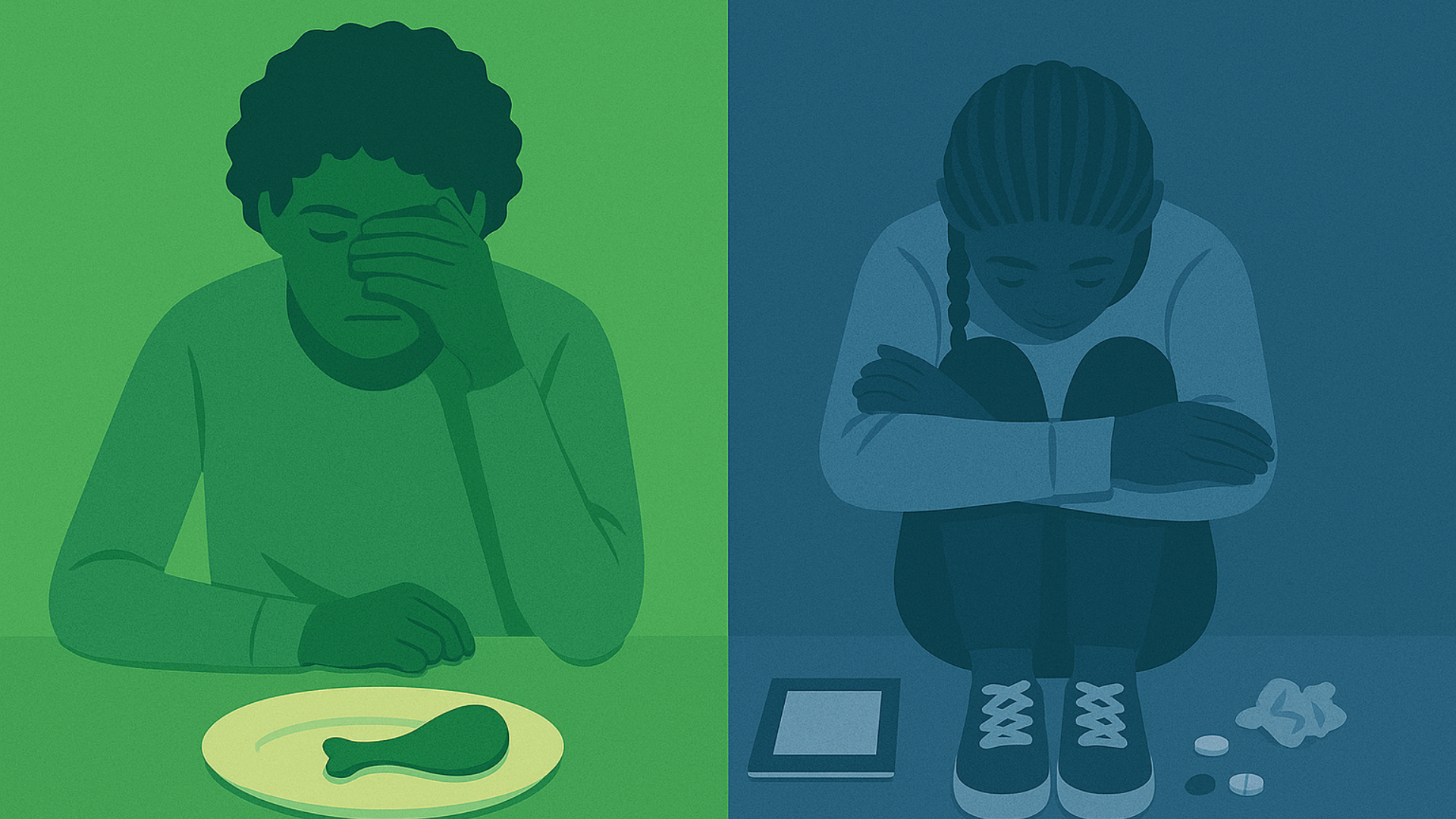Thrive’s Commitment To Supporting Our Community’s Parents

Becoming a parent is a life-changing experience that is profound and wonderful, but can also be extremely overwhelming and difficult. Thrive is committed to supporting our community’s parents, particularly with a range of mental health challenges that arise in connection with pregnancy and parenting, including perinatal mood and anxiety disorders.
What Are Perinatal Mood and Anxiety Disorders (PMADs)?
Perinatal mood and anxiety disorders (PMADs) is an umbrella term for a range of mental health conditions that arise during the perinatal period—that is, during pregnancy and throughout the first year postpartum—and which interfere with the ability to function and live life fully. We use the term PMADs, as it’s a common misconception that mental health struggles related to childbearing are exclusive to “postpartum depression.” Many people struggle before birth during pregnancy as well, and in addition to depression, PMADs can take other forms like anxiety, obsessive-compulsive symptoms, panic, post-traumatic stress, bipolar disorder, and psychosis. PMADs are the most common complication of pregnancy and childbirth!
What’s the Difference Between “Baby Blues” and PMADs?
The large majority— approximately 70 to 80 percent —of people will experience what we call the “Baby Blues” after giving birth. These symptoms can include mood swings, irritability, tearfulness, restlessness, fatigue, sadness, anxiety, difficulties concentrating, and trouble sleeping even when your baby is asleep. The “Baby Blues” are in part due to the major hormonal shifts taking place after giving birth, compounded with all the other stressors as part of this adjustment like sleep deprivation, postpartum recovery, considerable shifts in your responsibilities and roles, etc. These symptoms generally resolve within the first two to three weeks after birth.
Symptoms of PMADs generally persist beyond this timeframe and are more severe, to the point of interfering with your day-to-day life. In this case, you might benefit from additional support to stabilize and aid you in this big transition. It is estimated that up to 20 percent of people who give birth may experience depression or anxiety, and 10 percent of partners experience postpartum depression. Additionally, if one partner is experiencing a PMAD, the likelihood that their partner will also struggle with a PMAD increases to 50 percent !
Some Signs and Symptoms of PMADs
Some common symptoms of perinatal mood and anxiety disorders can include:
-
Persistent sadness
-
Anxiety
-
Feeling overwhelmed or “empty”
-
Crying episodes
-
Panic attacks
-
Chronic fatigue
-
Loss of interest in previously enjoyable activities
-
Avoidant behaviors
-
Persistent self-doubt
-
Disruptions in sleeping and/or eating patterns
-
Feelings of hopelessness, helplessness, guilt, and shame
-
Experiencing irritable and/or angry moods
-
Difficulty connecting with baby
-
Fear of being alone or separated from baby
-
Problems with concentration or making simple decisions
-
Intrusive thoughts of harming oneself or the baby*
-
Suicidal ideation*
-
Hallucinations and/or delusions*
*If you are experiencing any of these symptoms with asterixis above, these could be signs of a medical emergency, and you should contact 911 or a crisis support line for assistance. We’ve included the Suicide Prevention Lifeline information at the end of this blog.
If you or a loved one is experiencing any of the above, it’s time to reach out for support!
Risk Factors for PMADs
There is no single cause of PMADS; generally, it is a mix of biological, psychological, and social or environmental contributors. The possibility of developing a PMAD may be higher if you’re experiencing a range of risk factors, such as family or personal history of mental illness, financial strain, birth trauma, previous perinatal losses or experiences with the NICU, struggles with feeding your baby, or lack of social support. The perinatal period is often a time when previous trauma histories, such as neglect and emotional, physical, or sexual violence, can be re-triggered in overwhelming ways.
Additionally, significant racial disparities in maternal and infant health, as well as other forms of violence and discrimination, all contribute to parents of color being at twice the risk for perinatal anxiety and depression than for white parents. Economic inequities are also a risk factor, as 25 to 40 percent of parents with low socioeconomic statuses are likely to develop a PMAD. Other sociocultural factors can increase the risk of PMADs for many families, including experiences related to immigration and teen pregnancy. Insufficient research has been done currently on LGBTQIA+ families’ perinatal experiences, but it is reasonable to assume that they are also at increased risk given the high rates of trauma, violence, discrimination, and barriers to care they face.
Lean on Us for Support
For those struggling with perinatal mental health, it is common to feel alone, misunderstood, or hesitant to seek help due to stigma and fear of judgment. The good news is that PMADs are highly treatable, and support is a key indicator in resolution of symptoms! Thrive’s staff is passionate and skillful in treating PMADs, as well as a range of co-occurring disorders, such as eating disorders, substance use disorders, and more. The spectrum of Thrive’s perinatal services is outlined below:
Outpatient Services for PMADs:
-
Outpatient psychotherapy with therapists trained in PMADs and perinatal grief and loss
-
Specialized Reproductive Psychiatry/medication management
-
Primary care
-
Nutrition counseling
-
Family and couples therapy to support adjustment to the perinatal period
Our “It Takes a Village” Perinatal Day Program
Starting and raising a family was never meant to be done in isolation—at Thrive we truly believe that “ it takes a village” to do so. That’s why we started our perinatal day program with the same name. Our “It Takes a Village” program supports parents struggling with the full range of perinatal mental health symptoms, using a group therapy model that incorporates the most evidence-based forms of treatment for PMADs.
Clients in our “It Takes A Village” program learn to integrate psychoeducation, mindfulness, self-care, and other evidence-based coping skills to manage intrusive thoughts and urges, overwhelming emotions, and triggers that arise during the perinatal period. We support clients in developing a positive identity in their role as parents and healing from any past trauma from birth or otherwise, all the while promoting attachment and bonding with their baby.
We take a family systems approach, in that we also believe in supporting the whole unit (including partners, older children, and other important family members) to adjust to the new baby and life transition in a connected and constructive way. Perhaps above all, our program is designed to help parents find comfort and connection through building relationships with others in their community going through similar challenges.
The “It Takes a Village” program is five days per week, and babies are welcome and encouraged to come along! Services include:
-
Group therapy on topics including birth processing, attachment and bonding, yoga and mindful movement, nutrition and wellness, psychoeducation about PMADs, and coping skills to support anxiety management and emotional regulation
-
Optional weekly individual psychotherapy with a Thrive or partnered perinatal therapist, or close coordination between our team and your existing therapist (if applicable)
-
Weekly psychiatric consultation for close medication management
-
Closely coordinated care with all outpatient services outlined above
-
Direct referrals to important perinatal services such as lactation consultation, pelvic floor physical therapy, etc.
Free Perinatal Support Groups
Perinatal Mental Health Support Group
If you are struggling through pregnancy or postpartum, you’re invited to join us every Thursday at 9:30 am for our free 90-minute support group focused on perinatal anxiety, depression, and other mental health challenges. All meetings are held virtually via zoom.
Perinatal Loss and Grief Support Group
For those struggling with loss and grief related to a miscarriage, stillbirth, SIDS, early infant death, molar pregnancies, or other complications please join us for our free 60-minute support group Tuesdays at 9 am. All meetings are held virtually via zoom.
To learn more about our support groups please call 775-525-8103 or visit thrivewellnessreno.com.
An Important Note To Recognize All Parents and Paths To Family-Building
At Thrive, we recognize that people of all identities and backgrounds experience perinatal mental health challenges. All of our services are welcoming and attentive to a range of perinatal experiences that reflect diversity related to gender, sexual orientation, and family structure. We recognize there are many valid paths to building families, and we are eager to support all parents, including birthing individuals, partners, and otherwise non-gestational parents. This includes families whose stories include adoption, foster care experiences, surrogacy, and extended or polyamorous family systems.
You are not alone! Reach out to us by calling (775) 525-8103, and let us support you in your journey towards joyful and confident parenting!
If you are struggling with suicide ideation, behaviors, or an attempt, reach out to the National Suicide Prevention Lifeline at 800-273-8255.
The post Thrive’s Commitment To Supporting Our Community’s Parents first appeared on Thrive Wellness.








